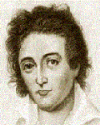PERCY BYSSHE SHELLEY
Source: http://www.stainedproductions.com/articles/frank_sh.gif
THE MASK OF ANARCHY
Written on the Occasion of the Massacre
at
[…]
As if their own indignant Earth
Which gave the Sons of
Had felt their blood upon her brow,
And shuddering with a mother's throe
Had turned every droop of blood
By which her face had been bedewed
To an accent unwithstood —
As if her heart cried out aloud:
‘Men of England, Heirs of Glory,
Heroes of unwritten story,
Nurslings of one mighty Mother,
Hopes of her and one another
‘Rise like Lions after slumber
In unvanquishable number,
Shake your chains to Earth like dew
Which in sleep had fallen on you —
Ye are many — they are few.
‘What is Freedom? — ye can tell
That which slavery is, too well —
For its very name has grown
To an echo of your own.
‘’Tis to work and have such pay
As just keeps life from day to day
In your limbs, as in a cell
For the tyrants' use to dwell,
‘So that ye for them are made
Loom and plough and sword and spade,
With or without your own will bent
To their defence and nourishment;
‘’Tis to see your children weak
With their mothers pine and peak
When the winter winds are bleak —
They are dying whilst I speak; […]
(139-171)
(1819)
Source:
Throughout
this poem, “The mask of Anarchy”, Shelley is addressing directly to the people
of
This title, “The mask of Anarchy”,
introduces that this poem will deal with political issues and it specially
talks about a kind of “government”, where there is an elimination of all forms
of government, in other words, the people become the government.
Shelley shows us that the country is
damaged because she has seen that her own people are living in bad conditions,
they are suffering and moreover, they continue being poor although they work
too much. And the reality is that the only people who are benefiting from their
work is the Government. Who considers the workers as if they were objects made
of loom, plough, sword and spade. Because of that, Shelley describes us that
the country is formed only by the citizens and not by the government, then, the
government is not necessary. And that’s why each citizen has to become the heir
of the Glory and the hero of a story and the citizens all together are the only
hope of the country. So, Shelley tries to motivate the people telling them that
they have to rise like lions and fight for justice. And finally, if they do not
rebel, their children and their women will be weak and then they will die gradually.
In this poem, Shelley uses an easy
structure and also an accessible vocabulary because he is addressing the
working class and he wants to be read and understood by everybody. Furthermore,
he also uses lots of negative adjectives when he is describing that situation,
such as “indignant Earth” (line 1); “unwritten story” (line 10); “children
weak” (line 30); “winter winds are bleak” (line 32) and also, he uses positive
and energetic adjectives to raise people’s hope. For example, we observe “Heirs
of Glory” (line 9); “mighty mother” (line 11); “unvanquishable number” (line
14). What’s more, the poet also uses sensitive nouns, such as “blood” (line 3);
“throe” (line 4); “every droop of blood” (line 5); “Freedom” (line 18);
“Slavery” (line 19). And finally, we can observe verbs that deals with action,
feelings and such as “rise” (line 13); “shake your chains” (line 15); “keeps
life” (line 23); “they are dying”. He
uses that vocabulary for the purpose of motivating the reader, that is, that
people who are in those bad conditions; making him / her think about their
present situation and finally, Shelley comments all this to encourage them to
go out to the street and do a revolution.
To refer to the structure, it is
well-structured. This poem is divided into eight stanzas, each one of four
lines. Except the fourth stanza where we can observe five lines. We can read
each line separately but many of them continue to the next line, so, Shelley
uses in many lines the enjambment, and it lets us read the full poem as if it
were a story and it makes the poem more rhythmic.
As we know, this poem was written on
the Occasion of the Massacre at
To sum up, I have read this poem
because it represents a historical moment of the history of
Personally, this poem has made me think
about my present life. My world is a bit different from Shelley’s world,
because the vast majority can get an education; supposedly, there are laws that
protect the children, the students, the workers and even those people who have
committed a crime.
At first sight, it would seem that we
are free and that our life system is the best, but nothing is so perfect. The
present society is moved only by money and popularity, and everything is around
it. Today, the governments continue earning more money than the citizens. And
there is still one government who believes that it is the own of the world and
it decides to attack other countries, kill people and get the wealth of that
attacked country. And then, what has happen with the people? Most of them have
died and others have suffered humiliations.
I admit that each person is different
and each one has his / her individual concept of life and how to live better,
but personally, I think that we have to enjoy our freedom provided that we
respect other’s freedom. And to conclude, unfortunately, I consider that
however much lifestyle changes, there will be people who are reduced to
poverty, that is the stark reality.
|
Reading module 02: Percy
Bysshe Shelley |
|
Academic year 2006 (May 2006)
© a.r.e.a./Dr.Vicente Forés López
© Ana Mª Pardillos Murillo
Universitat de València Press
mailto:aparmu@alumni.uv.es
